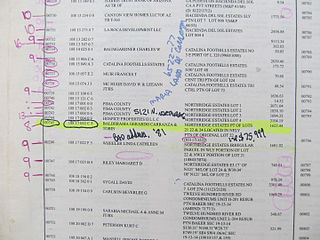Related Research Articles
Product liability is the area of law in which manufacturers, distributors, suppliers, retailers, and others who make products available to the public are held responsible for the injuries those products cause. Although the word "product" has broad connotations, product liability as an area of law is traditionally limited to products in the form of tangible personal property.
A statute of limitations, known in civil law systems as a prescriptive period, is a law passed by a legislative body to set the maximum time after an event within which legal proceedings may be initiated. In most jurisdictions, such periods exist for both criminal law and civil law such as contract law and property law, though often under different names and with varying details.
Wrongful deathclaim is a claim against a person who can be held liable for a death. The claim is brought in a civil action, usually by close relatives, as enumerated by statute. In wrongful death cases, survivors are compensated for the harm and losses they've suffered after losing a loved one.
A dram shop is a bar, tavern or similar commercial establishment where alcoholic beverages are sold. Traditionally, it is a shop where spirits were sold by the dram, a small unit of liquid.

A tax lien is a lien which is imposed upon a property by law in order to secure the payment of taxes. A tax lien may be imposed for the purpose of collecting delinquent taxes which are owed on real property or personal property, or it may be imposed as a result of a failure to pay income taxes or it may be imposed as a result of a failure to pay other taxes.
This article addresses torts in United States law. As such, it covers primarily common law. Moreover, it provides general rules, as individual states all have separate civil codes. There are three general categories of torts: intentional torts, negligence, and strict liability torts.
In law, a presumption is an "inference of a particular fact". There are two types of presumptions: rebuttable presumptions and irrebuttable presumptions. A rebuttable presumption will either shift the burden of production or the burden of proof ; in short, a fact finder can reject a rebuttable presumption based on other evidence. Conversely, a conclusive/irrebuttable presumption cannot be challenged by contradictory facts or evidence. Sometimes, a presumption must be triggered by a predicate fact—that is, the fact must be found before the presumption applies.
In the common law of England, the doctrine of worthier title was a legal doctrine that preferred taking title to real estate by descent over taking title by devise or by purchase. It essentially provides that a remainder cannot be created in the grantor's heirs, at least not by those words.

In the common law tradition, testamentary capacity is the legal term of art used to describe a person's legal and mental ability to make or alter a valid will. This concept has also been called sound mind and memory or disposing mind and memory.

In the statutory law of wills and trusts, an attestation clause is a clause that is typically appended to a will, often just below the place of the testator's signature.

Personal injury is a legal term for an injury to the body, mind, or emotions, as opposed to an injury to property. In common law jurisdictions the term is most commonly used to refer to a type of tort lawsuit in which the person bringing the suit has suffered harm to their body or mind. Personal injury lawsuits are filed against the person or entity that caused the harm through negligence, gross negligence, reckless conduct, or intentional misconduct, and in some cases on the basis of strict liability. Different jurisdictions describe the damages in different ways, but damages typically include the injured person's medical bills, pain and suffering, and diminished quality of life.

The administrator of an estate is a legal term referring to a person appointed by a court to administer the estate of a deceased person who left no will. Where a person dies intestate, i.e., without a will, the court may appoint a person to settle their debts, pay any necessary taxes and funeral expenses, and distribute the remainder according to the procedure set down by law. Such a person is known as the administrator of the estate and will enjoy similar powers to those of an executor under a will.

Forensic electrical engineering is a branch of forensic engineering, and is concerned with investigating electrical failures and accidents in a legal context. Many forensic electrical engineering investigations apply to fires suspected to be caused by electrical failures. Forensic electrical engineers are most commonly retained by insurance companies or attorneys representing insurance companies, or by manufacturers or contractors defending themselves against subrogation by insurance companies. Other areas of investigation include accident investigation involving electrocution, and intellectual property disputes such as patent actions. Additionally, since electrical fires are most often cited as the cause for "suspect" fires an electrical engineer is often employed to evaluate the electrical equipment and systems to determine whether the cause of the fire was electrical in nature.
Under United States law, account stated is a statement between a creditor and a debtor based upon a series of prior transactions that a particular amount is owed to the creditor as of a certain date. Often the account stated is a bill, invoice or a summary of invoices, signed by the customer or sent to the customer who pays part or all of it without protest.
Legal malpractice is the term for negligence, breach of fiduciary duty, or breach of contract by a lawyer during the provision of legal services that causes harm to a client.
The family purpose doctrine is "a court-created legal fiction that employs agency principles to impose vicarious liability on a head of the household for the negligent operation of a motor vehicle by a family member." In a typical case involving the doctrine, the so-called "head of the household" has given their family members permission to drive their car "for their general use, pleasure, and convenience," i.e., a "family purpose." Furthermore, plaintiffs in most American courts that follow the doctrine can prove the car was being used for a family purpose "merely by showing that it was being used by a family member with the defendant's consent." The underlying theory of the doctrine is that "the driver of a family car, in pursuit of recreation or pleasure, is engaged in the owner's business and is viewed as either the agent or servant of the owner." In some instances, the doctrine may apply to more than just traditional cars, such as motorbikes, trucks, and motor boats. Moreover, a plaintiff's family purpose doctrine claim does not necessarily fail if "the defendant has provided a separate vehicle for each licensed driver in the family, so that each family member ordinarily operates his or her own vehicle."
Feres v. United States, 340 U.S. 135 (1950), combined three pending federal cases for a hearing in certiorari in which the Supreme Court of the United States held that the United States is not liable under the Federal Tort Claims Act for injuries to members of the armed forces sustained while on active duty and not on furlough and resulting from the negligence of others in the armed forces. The opinion is an extension of the English common-law concept of sovereign immunity.
Shopkeeper's privilege is a law recognized in the United States under which a shopkeeper is allowed to detain a suspected shoplifter on store property for a reasonable period of time, so long as the shopkeeper has cause to believe that the person detained in fact committed, or attempted to commit, theft of store property.
Limitation periods in Irish law are set out in a variety of statutes and in judicial decisions but primarily the limitations applying to civil actions are set out in the Statute of Limitations, 1957 and the Statute of Limitations (Amendment) Act, 1991. These statutes impose a limit on the right of action so that after a prescribed period any action will be time barred. A list of cause of actions affected are listed under part two of the Statute of Limitations 1957.
Tolling is a legal doctrine that allows for the pausing or delaying of the running of the period of time set forth by a statute of limitations, such that a lawsuit may potentially be filed even after the statute of limitations has run. Although grounds for tolling the statute of limitations vary by jurisdiction, common grounds include:
References
- ↑ "Statute of repose". Wex. Cornell Law School. Retrieved 17 August 2017.
- ↑ "Gray v. Daimler Chrysler Corp., 821 N.E.2d 431 (Ind.Ct.App 2005)". Google Scholar. Retrieved 17 August 2017.
- ↑ "Kissel v. Rosenbaum, 579 N.E.2d 1322, 1326 (Ind.Ct.App.1991)". Google Scholar. Retrieved 17 August 2017.
- ↑ "P. Stolz Family Partnership LP v. Daum, 355 F.3d 92, 102 (2d Cir. 2004)". Google Scholar. Retrieved 17 August 2017.
- ↑ "CTS Corp. v. Waldburger, 134 S. Ct. 2175, 2185 (2014)". Google Scholar.
- ↑ See, for example, Ind. Code 34-20-3-1
- ↑ "In re Estate of Brown, 587 N.E.2d 686 (Ind. Ct. App. 1992)". Google Scholar. Retrieved 17 August 2017.
- ↑ "In re Estate of McNabb, 744 N.E.2d 569, (Ind. Ct. App. 2001)". Google Scholar. Retrieved 17 August 2017.
- ↑ See, e.g., Sec. 29-1-14-1 of the "Indiana Code, Title 29, Probate Code" (PDF). Indiana State Legislature. Retrieved 17 August 2017.